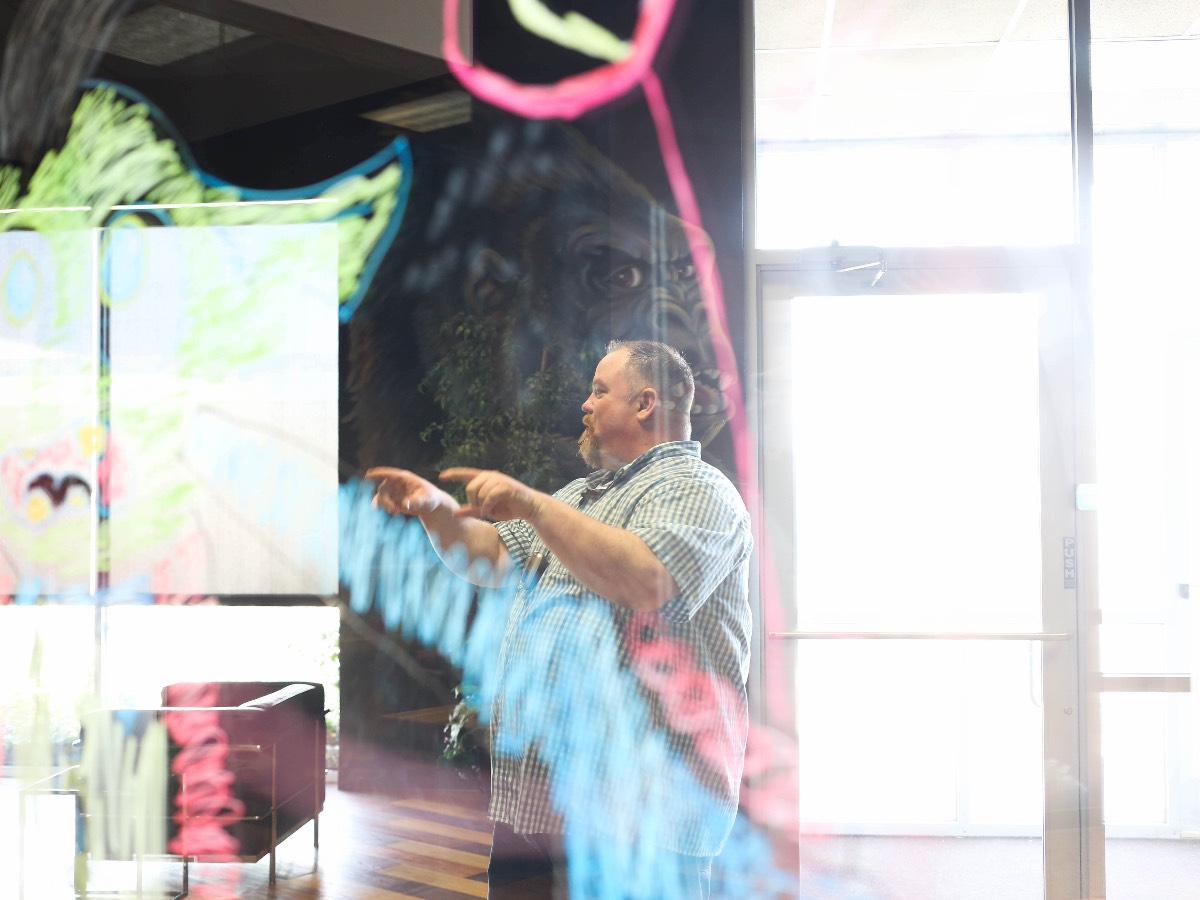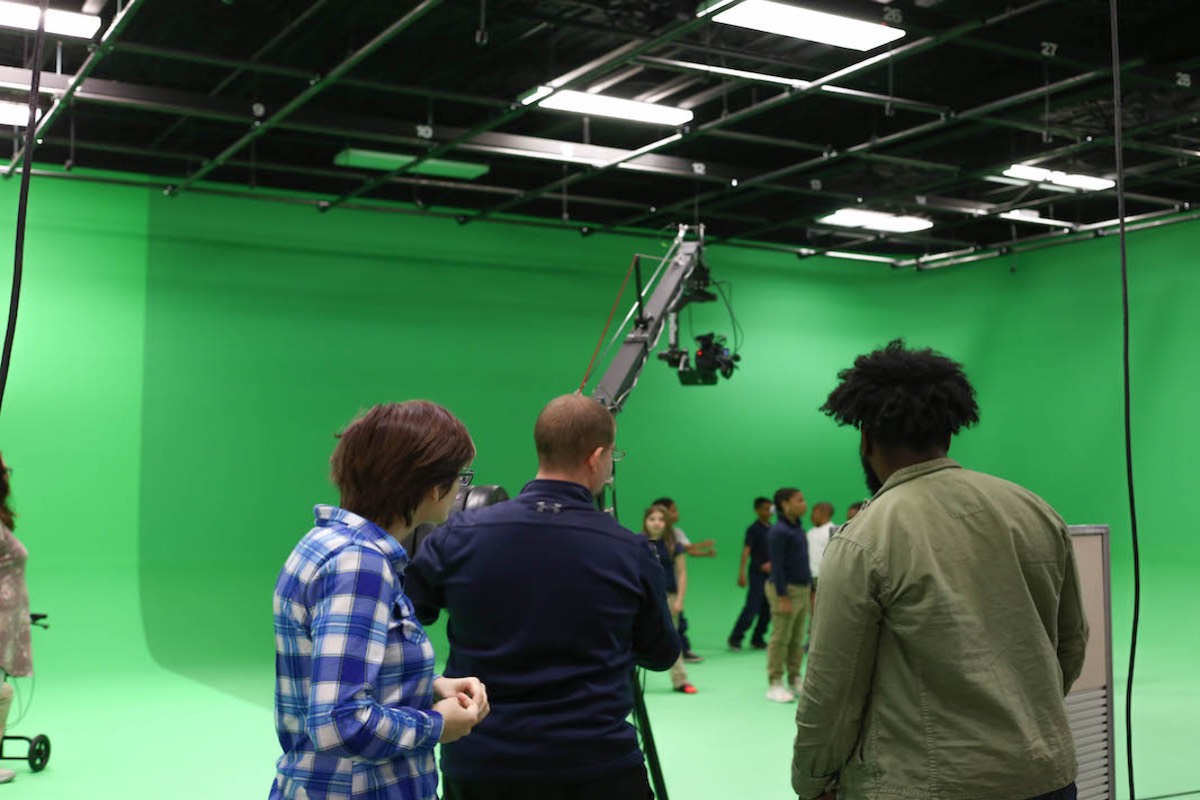Shocker Studios director Justin Rorabaugh looks out of his office at Shocker Studios (3805 E. Harry) and sees many innovation and collaboration possibilities. There are new studios and sound systems, creative spaces under construction and many opportunities to learn and work in the state-of-the-art sound, video and animation studios.
How does the work at Shocker Studios help guarantee an applied learning or research experience for WSU students?
This is a giant applied learning facility, so we have students from all over WSU, not just our media arts students.
We've grabbed onto the philosophy of this being applied learning, so this is all lab space for any WSU students. Any student that's wanting to work on a project . . . can come down and do that. Sometimes, there's barriers with skill-set, but they can be around students with that skill-set.
One of the things that's very important to me that these students have the opportunity to walk out of here with a high-quality education, but also a resume that says I've done this professional work and I've worked for these companies in internships, doing professional work.
So, we've had students work on everything from Amtrak videos to Snoop Dogg videos.
Shocker Studios
We rely heavily on student employees. I like to hire student employees from all across the university. I've got students from geology, anthropology, industrial engineering, pre-nursing.
 Alyssa Calbert
Alyssa CalbertHow do you keep up with a field that changes rapidly?
The biggest key to our keeping up is that we hire a lot of working professionals to be our adjunct (instructors), so you walk into class and you have an instructor that can come in and say and ‘Today, in my studio, this is what I worked on, this is how I did it.' It's that real-world, real-time information coming in from current working professionals. It's constantly evolving.
Since they're working industry professionals, they're telling us – this is how things are changed. That's how we stay current.
How unique is the Shocker Studios facility?
There's no other facility like this anywhere in the Midwest that combines all of these components. There's a lot of programs that do pieces of what we do, but none of them do it all under one roof and one collaborative space. The opportunity that arises from having it all under one space is tremendous.
The work that has happened for Snoop Dogg, the Republic of Humanity work has helped in that aspect. (For a film project) we're able to have film-makers, audio and once it comes in-house we'll have some animation stuff and motion graphics. Through this independent film, you get to see several aspects come together. In a different setting, it would be contacting one department to see if they have anybody interested in film-making and contacting a different one to see if they have any sound engineers.
Is there a space in Shocker Studios you are particularly proud to show off?
It's the entire facility. For instance, our audio post-production lab is set up with 5.1 surround (sound), so you can go in there and work. We're putting editing bays in there this year, to where if someone is working on a particular project they can go in there and have a workspace for them to be creative.
Say they're working on a film. If they want to make sure it's tracking the right way at 5.1 they can cast that out to the room and actually hear it and make sure it sounds the way they want it to, that they've got the levels set the way they want.
To be able to walk into a professional-level recording studio and take that file directly to an editing bay is a wonderful luxury to have. A ton of people now have recording students in the basements or their garages. To have it in an actual that's setup and designed specifically for that, not re-purposed for that, makes a huge difference.
 File photo
File photoHow do the skills learned in Shocker Studios apply to other professions for students?
While there's a lot of times there's a unique industry that these things fit into, with the skill-sets we're doing through the applied learning at Shocker Studios there is a much broader application through multiple industries that is possible.
Whether that's health-care, whether that's manufacturing . . . The components we learn when designing a game are very applicable and transferable to other industries. A lot of game-designers will come and they want to go and design games for Blizzard (Entertainment) or EA Sports. It's just like that kid that says ‘I'm going to go to play football for the Kansas City Chiefs.' A few may. Most will go off and do other great things. It's helping them be able to harness that and see what those opportunities are and creative and innovative ways for them to implement their skill-sets into other industries.
Where does Shocker Studios go next?
We've already started conversations in ways to branch our fields out into . . . other industries and doing that ways in that are a little more prescriptive.
For instance, creating cadaver-less cadaver labs with VR (virtual reality). Finding a way to work with surgeons to do body-scanning to where they could do a virtual pre-surgical look at the human body. Everybody is built differently, so finding a way we could scan that and then use VR technology to take a pre-surgical look.
They're doing that right now through imaging, so what's the next step? Let's take that imaging and put it in a virtual setting, to where you can manipulate that virtually to see if what you're prescribing for treatment will indeed result in this. How will it respond?
Another next step is that we're in talks with some different people and eventually we would like to produce our own major motion picture out of Shocker Studios in partnership with whomever. We could have our own product out there that's at a major caliber. We're going to start with a series of doing animated shorts and things like that. It's a multi-year, working with these folks from studios around the country (project).
I also see the opportunity for us to do some things as our own recording label. It takes people and passion and creativity.

